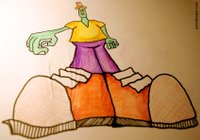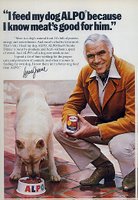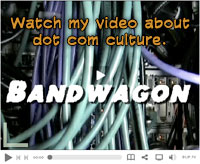A new TLA often creates FUD. (Fear, Uncertainty and Doubt) Has our language become too cumbersome? Are we in such a hurry that we can’t be bothered saying so many words? “I’m sorry,” we say, “I’d love to talk to you but I am in a tremendous hurry. Perhaps I could just say the first letter of each word of every sentence?” WTF!
Every industry has its own particular acronyms. Our internet industry is one of the greatest creators of new TLAs, but we also share many traditional ones as well. I’ve included some fun examples below and I pose the question, “Do we need more acronyms or less?”
WWTD? (What would Tim Burners-Lee Do?)
I decided not to list “
chat speak” which is a language all its own. These abbreviations are almost emoticons describing fleeting feelings, lol. (Laugh out Loud)
PEBKAC (Problem Exists Between Keyboard And Chair) A subtle way technical support people describe a problem caused by a user who can’t figure out how to use a computer.
RTFM (Read The Frickin’ Manual) A response to an obvious computer question may illicit this abbreviation.
SWOT (Strengths Weaknesses Opportunities & Threats) A strategic analysis technique developed at Stanford in the 1960s as a way to compartmentalize planning.
CYA (Cover Your Ass) When creating contracts or proposals, this is a more fun way to say “assumptions” or “caveats”.
SWAG (Stuff We All Get) The free stuff given away to those in (or near) the internet industry. But, as I wrote about in
SWAG Stories, this one has many definitions.
OOF (Out Of Facility) Originally used in academic settings and has now come to mean Out of the Office in the corporate world.
FUBAR (Fucked Up Beyond All Repair) Borrowed from the military, like many of our acronyms. Used to describe a project that will never get well.
SNAFU (Situation Normal, All Fucked Up) A WWII term the troops used to describe that everything is as screwed up as usual.
IP (Internet Protocol) or (Intellectual Property) I’ve been in quite a few digital studio environments where it was not always clear whether the conversation was about IP numbers for the server or ownership rights regarding a piece of content.
ASP (Active Server Pages) or (Application Service Provider) Many acronyms have multiple meanings, but this one in particular can get quite confusing. An ASP may run ASP, for example.
Even
TLA has multiple meanings. It can mean Three Letter Acronym, Trial Lawyers Association, True Love Always or Top Level Architecture.
Want to explore more? Go to the
Internet Acronyms Dictionary. We could go on and on… 24/7.
Labels: business, definition, lexicon, Todd+Tibbetts
 To grok is to know. If you really truly understand, then you grok it. You have become one with it and you have enveloped the meaning.
To grok is to know. If you really truly understand, then you grok it. You have become one with it and you have enveloped the meaning.



 CamelCase is used to describe mashing compound words together and capitalizing the first letter of each word. Just like camels, these words have humps. I am noticing that this practice is being used more and more every day. Popular examples are AstroTurf, RadioShack, BlackBerry and QuickTime.
CamelCase is used to describe mashing compound words together and capitalizing the first letter of each word. Just like camels, these words have humps. I am noticing that this practice is being used more and more every day. Popular examples are AstroTurf, RadioShack, BlackBerry and QuickTime. 




